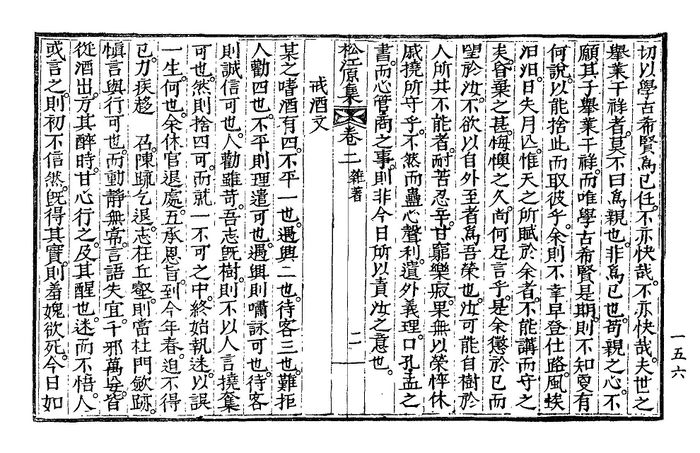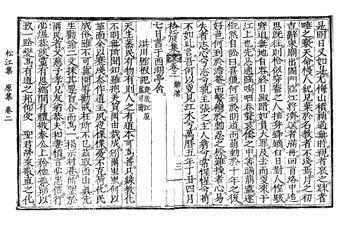(Translation) 鄭澈 戒酒文
| Primary Source | ||
|---|---|---|
 |
Title | |
| English | ||
| Chinese | 戒酒文 | |
| Korean(RR) | 계주문(Gyejumun) | |
| Text Details | ||
| Genre | Literati Writings | |
| Type | 雜著 | |
| Author(s) | 鄭澈 | |
| Year | ||
| Source | Korean Classics and Literati's Collection of Writings (한국고전종합DB) | |
| Key Concepts | ||
| Translation Info | ||
| Translator(s) | Participants of 2019 JSG Summer Hanmun Workshop (Advanced Translation Group) | |
| Editor(s) | ||
| Year | 2019 | |
목차
- 1 Introduction
- 2 Original Script
- 3 Discussion Questions
- 4 Further Readings
- 5 References
- 6 Translation
- 6.1 (sample) : Jaeyoon Song
- 6.2 Student 1 : (Write your name)
- 6.3 Student 2 : (Write your name)
- 6.4 Student 3 : Younès M'Ghari
- 6.5 Student 4 : King Kwong Wong
- 6.6 Student 5 : (Write your name)
- 6.7 Student 6 : (Write your name)
- 6.8 Student 7 : Russell Guilbault
- 6.9 Student 8 : (Write your name)
- 6.10 Student 9 : (Write your name)
- 6.11 Student 10 : (Write your name)
- 6.12 Student 11 : (Write your name)
- 6.13 Student 12 : (Write your name)
Introduction
Original Script
| Classical Chinese | English |
|---|---|
|
某之嗜酒有四。不平一也。遇興二也。待客三也。難拒人勸四也。不平則理遣可也。遇興則嘯詠可也。待客則誠信可也。人勸雖苛。吾志旣樹。則不以人言撓奪可也。然則捨四可。而就一不可之中。終始執迷。以誤一生。何也。余休官退處。五承恩旨。到今年春。迫不得已。力疾趨召。陳疏乞退。志在丘壑。則當杜門斂跡。愼言與行可也。而動靜無常。言語失宜。千邪萬妄。皆從酒出。方其醉時。甘心行之。及其醒也。 迷而不悟。人或言之。則初不信然。旣得其實。則羞媿欲死。今日如是。明日又如是。尤悔山積。補過無時。親者哀之。疏者唾之。褻天命。慢人紀。見棄於名敎者不淺焉。月之初吉。辭家廟。出國門。臨江將濟。送者滿舟。回首洛中。追思旣往。則恰似穿窬之人。抽身鋒鏑。白日對人。惶駭窘迫。無地自容。終日踧踖。如負大罪。及去而更來于江上也。 先忌適臨。嗚咽呑聲。哀慘之中。善端萌露。遂慨然自訟曰。喜獵何到於明道。而萌動於十年之後。好色何到於澹菴。而繫戀於動忍之餘。難操者心。易失者志。心兮志兮。孰主張之。主人翁兮。常惺惺兮。苟不如此言。吾何以更見江水兮。萬曆五年丁丑四月七日。書于西湖亭舍。 |
(translation) |
Discussion Questions
Further Readings
References
Translation
(sample) : Jaeyoon Song
- Discussion Questions:
Student 1 : (Write your name)
- Discussion Questions:
Student 2 : (Write your name)
- Discussion Questions:
Student 3 : Younès M'Ghari
- Discussion Questions:
Is this essay intended to anyone? Is it something that the author wrote for himself? If so, was it a common practice among scholars?
Would it be possible that the author was trying to avoid having any link with the king of the time?
Has the author written anything related to his father's death in another manuscript?
Student 4 : King Kwong Wong
ing
- Discussion Questions:
Considering the political situation of Chŏng Ch'ŏl (Jeong Cheol), why did he wrote this prose? What are the points he was try to make?
Student 5 : (Write your name)
- Discussion Questions:
Student 6 : (Write your name)
- Discussion Questions:
Student 7 : Russell Guilbault
- Discussion Questions:
- The piece flows between admonitions against drinking and a personal narrative about Jeong Cheol's personal misfortunes. Many of his misfortunes seem to have more to do with political infighting, etc., than with drinking. So are they mentioned just to elicit sympathy? Or does he consider alcohol partly responsible for the problems he sees in Joseon political culture more broadly?
Student 8 : (Write your name)
- Discussion Questions:
Student 9 : (Write your name)
- Discussion Questions:
Student 10 : (Write your name)
- Discussion Questions:
Student 11 : (Write your name)
- Discussion Questions:
Student 12 : (Write your name)
- Discussion Questions:
